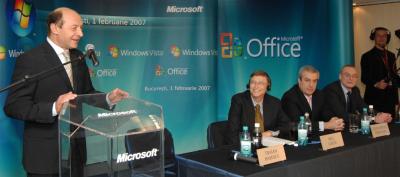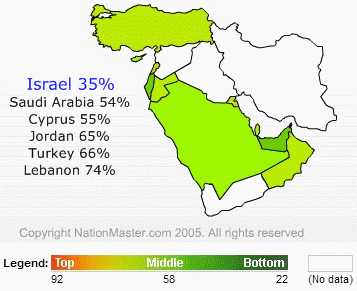Visiting Romania for the launch of the new Windows Vista PC operating system and the opening of a Microsoft ‘global technical center' in Bucharest, Microsoft Chairman and soon-to-be full-time philanthropist Bill Gates (William Henry the 3rd to his friends) was surprised with a staggering uppercut punch from Romanian President Traian Băsescu.
Figuratively speaking, of course. The harm caused was much worse than if President Băsescu had actually one-off punched a smiling, bespectacled Gates.

Assuming that the Romanian President's words were properly understood (translation gaffes are all the rage, especially when the truth slips out) as he spoke from a hollow Microsoft-logo-adorned lectern, he reportedly said that “piracy helped the young generation discover computers. It set off the development of the IT industry in Romania”, and that “it was an investment in Romania's friendship with Microsoft and with Bill Gates”. Yes, and Palestinian car thieves are making an investment in their friendship with Ford, Mercedes and Toyota, enabling the chop shop/spare parts industry to become a flower of the Palestinian Authority's economy :p
The irresponsibility behind such statements is astounding yet not surprising. After all, many people don't see software piracy as crime, or something that they should go to jail for.
IT IS.
Software piracy is usually defined as ‘the illegal distribution and/or reproduction of software for business or personal use'. As Adobe explains– unlike most any other purchase, people don't buy software, they buy a license to use software. This subtle, often-misunderstood difference is part of the problem and one of the reasons why I distinguish between two kinds of software piracy, intentional and inadvertent:
Intentional Software Piracy – This is the well-known kind that prospered blank CD makers and caused countries like France to tax recordable media because it was easier than fighting the pirates. In this case, copies of commercial software are spread freely or sold with a ridiculously low price tag. Before the Internet tremendously simplified global distribution, many of these copies were the fruits of trips to Hong Kong's Golden Shopping Arcade where you could have pretty much any software you wanted – tens of thousands of dollars worth – for the price of the blank disc onto which it would all be burned. Needless to say, today you can find whatever you want with only a few mouse clicks while hunched over your keyboard.
The Rub: the pirates/dealers know that they are criminals and almost no one debates that side of the coin. My concern here is for the users of illegal copies; it's safe to say that many if not most are aware that what they're doing is wrong yet because pirated software is so cheap and easy to find, it doesn't feel like a crime is being committed and even if there is one, it's not such that anyone suffers since software companies are perceived universally as faceless corporations. The fact is that Microsoft and the other large software producers lose hundreds of millions of dollars due to piracy and must spend equivalent sums in anti-piracy campaigns. Smaller, ‘less faceless' (faceful?) companies simply die out because they can't recoup on their development investment as people are sharing their software for free.
Inadvertent Software Piracy – In this case, people may have even paid for the software but their usage of it doesn't conform with the acquired software license. For example, buying one copy of Microsoft Word but installing it on multiple computers in the home. Or – for a long time, many people considered shareware to be free (many still do) because you aren't asked to pay for it before downloading – but no, that's freeware – and so they continue using it even after getting annoyed with popups saying ‘your trial period is over. Please register this program now'. Another example – as someone who works from home, I need to be careful about using software that's ‘free for personal/non-commercial use only' when I'm clearly using my computer for personal and commercial use.
The Rub: most people simply aren't aware of this issue and don't understand what a software license is. How often do people actually read EULAs (End User License Agreements) when they install a downloaded program? Of those who have attempted to read them, how many people actually understood what they read? The legalese is often somewhere between atrocious to hallucination-inducing and each EULA is different. The very few people who tried to read them likely gave up in frustration or perhaps now rely on software like Eulalyzer, which is better than nothing. In addition, the major operating systems don't have built-in, easy-to-use tools (that I'm aware of) for helping users navigate through these company-imposed constraints, which leaves each company to fend for itself. The bigger companies will be able to do so and that is why today we have Microsoft's Windows Genuine Advantage program. Smaller companies may not be able to afford the extra development and customer support involved, and so the consequences of this type of piracy is proportionally greater to them.

Israel has the lowest piracy rate in the Middle East
Why You Should Not Use Pirated Software
- It is a crime. Laws are made to be enforced but many people take comfort in the fact that the police can't arrest everyone (which the police would almost have to do when it comes to users, based on statistics). However – many, many people pay fines when they're caught speeding so in the future it could become the norm. Even if you can get away with it, you should still be bothered by the fear you would feel when the police came knocking at your office or home.
- Pirated software often contains viruses or malware that could e.g. turn your computer into part of a botnet, and thus usable remotely by hackers for other nefarious purposes, possibly even for organized crime.
- Software companies are all impacted but the little guy is hit hardest – it's not just faceless mega-corporations as many people justify to themselves; although as I point out above, they are the most capable of surviving to fight piracy with their deep pockets. The small and medium-size companies are a different story – with possibly only one software product to sell in limited distribution, they will usually need to charge a high price for their specialized software in order to recoup their investment. Illegal copies would cut off their only source of limited revenue and possibly force them to go bankrupt, as almost happened to Montreal-based SoftImage before it was purchased by Microsoft in the '90s. Ironically, Microsoft then went on to pirate someone else's software in an attempt to add value to the SoftImage product.
- Criminals use pirated software to finance their activities e.g. Palestinian terrorists use it to finance their attacks on Israelis. Better think twice before buying some cheap CD on the 6th floor of the Central Bus Station in Tel Aviv.
What Can You Do?
- Buy software legally or use freeware. Don't buy pirated software, don't borrow it from a friend and then install it on your computer, don't download it.
- How many people can say that all the software on their computer was paid for? Odds are that you aren't one of those people and if so, uninstall any unpaid software.
- Educate others on the perils of pirated software.
- Tell software companies that you need their help in understanding their EULA so that the software industry better comprehends how it can do more to reduce inadvertent piracy; they need your help even more.
- Support anti-piracy organizations like the Business Software Alliance. Even if they are somewhat hysterical to the point of exaggeration and thus just as easy to dislike as the RIAA when it fought Napster, their intentions are good and they have proven capable in rallying at least parts of the software industry.




It is theft and people are too easy about doing it anyway.